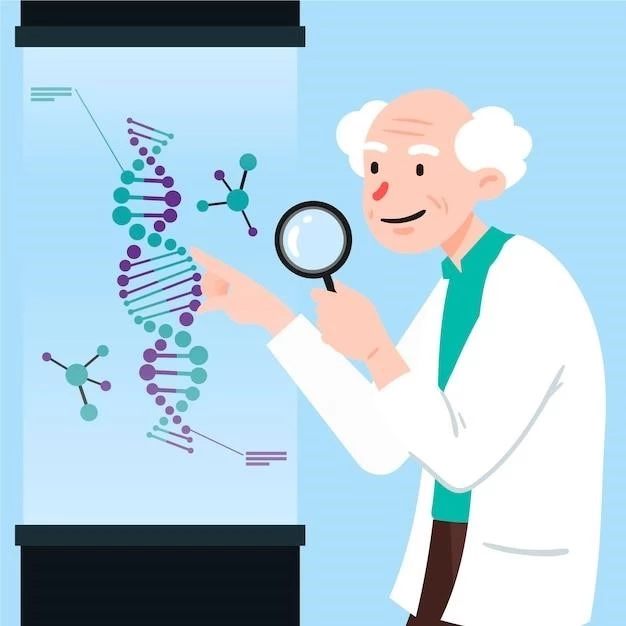Discover the manifestations of Birt-Hogg-Dube Syndrome, crucial for early detection and treatment․
Overview of Birt-Hogg-Dube Syndrome Symptoms
Understanding the symptoms of Birt-Hogg-Dube Syndrome is vital for timely intervention․ Common signs include skin lesions, lung cysts, and kidney tumors, which necessitate close monitoring and prompt medical attention․ Individuals may also experience recurrent pneumothorax, or collapsed lung, highlighting the importance of early diagnosis and comprehensive management․ Awareness of these symptoms enables healthcare providers to offer specialized care and support, improving outcomes for those affected by this genetic condition․
Understanding the Genetic Mutation Responsible for Birt-Hogg-Dube Syndrome
Birt-Hogg-Dube Syndrome is primarily caused by mutations in the FLCN gene, leading to abnormal cell growth and potentially tumor formation․ These genetic alterations disrupt cellular pathways, contributing to the development of skin, lung, and kidney manifestations characteristic of the syndrome․ By unraveling the intricacies of this genetic mutation, researchers aim to enhance diagnostic methods and therapeutic strategies, ultimately improving the care and quality of life for individuals affected by Birt-Hogg-Dube Syndrome․
Methods Used for Diagnosing Birt-Hogg-Dube Syndrome
Diagnosing Birt-Hogg-Dube Syndrome involves a comprehensive approach, including physical examinations, imaging studies like CT scans and MRIs, and genetic testing to identify mutations in the FLCN gene․ Skin biopsies and renal ultrasounds may also be performed to detect characteristic manifestations of the syndrome․ Collaborative efforts between healthcare professionals specializing in genetics, dermatology, pulmonology, and urology are crucial for accurate diagnosis and personalized treatment planning․ Timely and precise diagnosis enables proactive management and improved outcomes for individuals with Birt-Hogg-Dube Syndrome․
Available Therapeutic Approaches for Managing Birt-Hogg-Dube Syndrome
Managing Birt-Hogg-Dube Syndrome involves a multidisciplinary approach tailored to the individual’s specific symptoms and needs․ Treatment options may include surgical intervention for kidney tumors, laser therapy for skin lesions, and lung interventions for pneumothorax․ Additionally, ongoing monitoring and surveillance are crucial to detect and address potential complications promptly․ Collaborative care by a team of specialists, including dermatologists, pulmonologists, and urologists, is essential for comprehensive management and optimizing the quality of life for individuals with Birt-Hogg-Dube Syndrome․
Outlook and Predictions for Individuals Living with Birt-Hogg-Dube Syndrome
Individuals with Birt-Hogg-Dube Syndrome can lead fulfilling lives with proper management and surveillance․ Regular medical follow-ups, lifestyle modifications, and adherence to treatment plans can enhance quality of life and mitigate potential complications․ Advances in research and personalized medicine offer hope for improved outcomes and novel therapeutic approaches․ Engaging in a proactive approach to healthcare, individuals with Birt-Hogg-Dube Syndrome can navigate their condition effectively and achieve a positive prognosis․
Latest Developments and Breakthroughs in Birt-Hogg-Dube Syndrome Research
Ongoing research in Birt-Hogg-Dube Syndrome is unveiling promising insights into the underlying mechanisms and potential targeted therapies․ Recent studies focus on identifying biomarkers for early detection, exploring molecular pathways driving tumor development, and investigating novel treatment modalities․ Collaborative international efforts are paving the way for precision medicine approaches, genetic counseling advancements, and improved patient outcomes․ By staying abreast of these breakthroughs, healthcare providers can offer cutting-edge care and empower individuals with Birt-Hogg-Dube Syndrome to make informed decisions regarding their health․
Guidance and Support for Families Affected by Birt-Hogg-Dube Syndrome

Genetic counseling for families with Birt-Hogg-Dube Syndrome offers crucial insights into the hereditary nature of the condition, risk assessment for family members, and informed decision-making․ Counselors provide emotional support, facilitate genetic testing, and empower families to navigate the complexities of genetic conditions․ By fostering open communication and education, genetic counseling equips families with the tools to understand the implications of the syndrome, make proactive healthcare choices, and access resources for comprehensive care and management․
Strategies for Improving Quality of Life and Health Outcomes in Birt-Hogg-Dube Syndrome Patients
Lifestyle management plays a pivotal role in enhancing well-being for individuals with Birt-Hogg-Dube Syndrome․ Recommendations may include regular exercise, a balanced diet, and smoking cessation to promote overall health․ Maintaining a healthy weight and managing stress levels are essential components of self-care․ Additionally, staying compliant with medical appointments and screenings can aid in early detection of complications․ By adopting these strategies and working closely with healthcare providers, individuals with Birt-Hogg-Dube Syndrome can optimize their health outcomes and quality of life․
